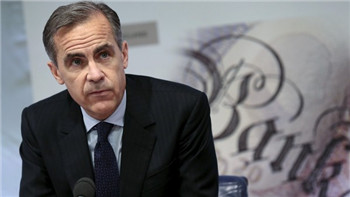
Anyone hoping for a concerted effort to boost global growth will have been disappointed by the familiar combination of bland public conclusions and behind the scenes sniping at the G20 gathering in Shanghai. Policymakers committed to use all tools — monetary, fiscal and structural — to strengthen the recovery. But in reality, many are deferring difficult reforms and hoping that others will shoulder the burden of fiscal expansion. As for monetary policy, there is a clear concern that the latest weapon in central banks’ armoury — the adoption of negative interest rates — may amount to little more than a new way to wage an old-fashioned, beggar-thy-neighbour currency war.
每一个希望各国协同努力提振全球增长的人,都会对20国集团(G20)上海会议呈现出的令人熟悉的组合——即乏味的公开结论加暗地里的相互诋毁——感到失望。政策制定者们承诺使用货币、财政和结构性政策等一切工具来强化复苏。但在现实中,许多国家却拖延实施艰难的改革,寄望于由其他国家来肩负起财政扩张的重担。至于货币政策,会议上存在一种明确的担忧:央行武器库里的最新武器——负利率政策——或许不过是换了一种新的方式来发起老一套的“以邻为壑”的货币战争。
Mark Carney, the Bank of England governor, set out this concern most forcefully. It is critical for central banks to structure stimulus measures in ways that boost domestic demand, he argued, so that a “rising tide” of global demand could “lift all boats”.
英国央行(BoE)行长马克愠尼(Mark Carney,见上图)最为犀利地阐述了这种担忧。他主张,央行应以能够增加内需的方式来构建刺激措施,这一点至关重要,因为只有这样全球需求“高涨的潮水”才可以“托起所有的船只”。
Negative interest rates are intended to achieve this, forcing banks to seek out riskier lending opportunities and assets, and encouraging consumers and borrowers to spend. It is plausible and technically possible for them to do so. However, many banks, and policymakers, are proving unwilling to make retail customers feel the full effects.
负利率政策的本意就是达成这一效果,迫使银行寻求风险更高的放贷机会和资产,鼓励消费者和借款者增加支出。这是合理的,在技术上也是有可行性的。然而,很多银行和政策制定者并不情愿让零售客户充分感受到负利率政策的影响。
Mr Carney therefore argues that there are limits to what the latest burst of innovation by central banks can achieve. If they craft policies in ways that shield retail customers, negative rates are unlikely to do much to stimulate domestic demand. Instead, the main effect will be on the exchange rate.
因此卡尼认为,央行这轮创新能够实现的效果是有限的。如果央行制定的政策绕开零售客户,负利率就不太可能在刺激内需方面起到多大作用。相反,主要受影响的将是汇率。
This is attractive to the country concerned but it rapidly becomes a zero sum game, since “for monetary easing to work at a global level it cannot rely on simply moving scarce demand from one country to another”.
这对有关国家而言很有吸引力,但这会迅速演变成一种零和游戏,因为“要使货币宽松措施在全球层面起作用,就不能仅仅依赖于将稀缺的需求从一个国家转移到另一个国家”。
This is a clear criticism of negative interest rates as they are practised in countries such as Japan, which adopted the policy in January but has kept paying interest on most bank reserves, allowing banks to keep rates positive for retail depositors. In the clubby world of central banking, such a forthright attack by Mr Carney on his peers is remarkable.
这是对多家央行实行的负利率政策的明确批评。日本央行从今年1月开始实行负利率政策,不过依然为大部分的银行存款准备金支付利率,这使银行能够继续为零售储户提供正利率。在央行这个小圈子里,卡尼对同行们如此直言不讳的抨击是非同寻常的。
His intervention is also important because the European Central Bank is considering adopting a similar tiered system, which might enable it to cut rates even further below zero without undermining confidence in the eurozone’s fragile banks.
而他出面发出干预也十分重要,因为欧洲央行(ECB)也在考虑实行与日本类似的分级机制。这种机制或许能令该行将利率进一步下调到更大的负值,同时又不会降低人们对欧元区脆弱的银行的信心。
The ECB faces a difficult choice. With the latest data showing that the eurozone has once more slipped into deflation, policymakers are under pressure to cut the deposit rate further into negative territory at this month’s meeting. If they leave lenders exposed to the full effects, they risk triggering a fresh sell off in banking shares. If they follow Japan’s lead and try to shield banks and retail depositors, they lay themselves open to accusations of currency wars.
欧洲央行面临着艰难选择。最新数据显示欧元区已再次陷入通缩,在本月的会议上,政策制定者面临将存款利率降到更大负值的压力。如果他们让银行暴露于负利率政策的全面影响之下,可能会引发对银行股的新一轮抛售。如果他们效仿日本的做法,试图把银行与零售储户保护起来,就会让自身面临发起货币战争的谴责。
Yet Mr Carney’s criticism is fair. His concerns are likely to be shared in the US, where policymakers are increasingly calling attention to the risks a stronger dollar poses to growth.
不过,卡尼的批评是公道的。美国可能会有人怀有同样的顾虑。在美国,政策制定者们日益呼吁人们注意美元走强给增长带来的风险。
It is also correct to warn that “at the global zero bound, there is no free lunch”. The surge in the value of the yen since the Bank of Japan’s move suggests that using negative rates as a tool for devaluation is at best an unreliable strategy. At worst, it risks reinforcing the impression that central bankers are acting out of desperation.
此外,“全球利率零下限环境下不存在免费午餐”的警告也是正确的。日本央行实行负利率政策以来日元汇率的飙升说明,把负利率作为贬值工具,往好了说是一种不可靠的策略,往坏了说可能会加深央行的行动是出于绝望的印象。
Mr Carney contends it is a myth that central banks are “out of ammunition”. But he ends his speech with an admission that central bankers cannot restore the global economy to health without help from governments.
卡尼认为,央行“用尽弹药”的说法是无稽之谈。不过,他在讲话的末尾承认,若没有来自政府的帮助,各国央行无法让全球经济恢复健康。












